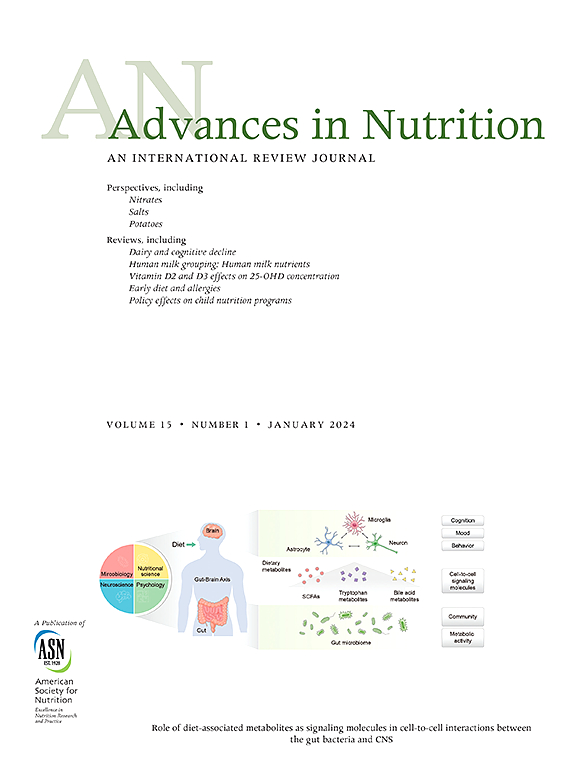观点:个性化营养的数据:桥接生物医学、心理行为和食品环境方法对人口的广泛影响。
IF 9.2
1区 医学
Q1 NUTRITION & DIETETICS
引用次数: 0
摘要
个性化营养(PN)是一种旨在提供量身定制的饮食建议、产品或服务的方法,以支持预防和治疗与营养相关的疾病,并利用遗传、表型、医学、营养和其他相关信息改善个人健康。然而,目前的方法在改善饮食或减轻饮食相关疾病方面取得的科学成功有限。此外,PN目前只服务于人口中的一个特定亚群体,而不是在人口层面上对饮食和健康产生广泛影响。解决这些挑战需要将传统的生物医学和饮食评估方法与心理行为相结合,以及用于综合数据收集的新型数字和诊断方法,这在缓解当前PN缺点方面具有相当大的希望。这种全面的方法不仅允许获得个性化的目标(“应该实现什么”),而且还允许定制行为改变过程(“如何带来改变”)。我们在此概述并讨论了“适应性个性化营养建议系统”(APNASs)的概念,该系统融合了来自三个评估领域的数据:1)生物医学/健康表型;2)稳定动态的行为特征;3)食品环境数据。设想个性化目标和行为改变过程不再仅仅基于静态数据,而是基于个人特定数据实时动态地进行调整。为了成功整合生物医学、行为和环境数据以实现个性化饮食指导,先进的数字工具(如传感器)和基于人工智能(AI)的方法将是必不可少的。总之,将现有的和新的静态和动态评估范式结合起来,将PN从目前对精英营养的关注转变为一种广泛获取的工具,为普通人群提供有意义的健康益处,具有巨大的潜力。本文章由计算机程序翻译,如有差异,请以英文原文为准。
Data in Personalized Nutrition: Bridging Biomedical, Psycho-behavioral, and Food Environment Approaches for Population-wide Impact
Personalized nutrition (PN) represents an approach aimed at delivering tailored dietary recommendations, products, or services to support both prevention and treatment of nutrition-related conditions and to improve individual health using genetic, phenotypic, medical, nutritional, and other pertinent information. However, current approaches have yielded limited scientific success in improving diets or in mitigating diet-related conditions. In addition, PN currently caters to a specific subgroup of the population rather than having a widespread impact on diet and health at a population level. Addressing these challenges requires integrating traditional biomedical and dietary assessment methods with psycho-behavioral, and novel digital and diagnostic methods for comprehensive data collection, which holds considerable promise in alleviating present PN shortcomings. This comprehensive approach not only allows for deriving personalized goals (“what should be achieved”) but also customizing behavioral change processes (“how to bring about change”). We herein outline and discuss the concept of “Adaptive Personalized Nutrition Advice Systems,” which blends data from 3 assessment domains: 1) biomedical/health phenotyping; 2) stable and dynamic behavioral signatures; and 3) food environment data. Personalized goals and behavior change processes are envisaged to no longer be based solely on static data but will adapt dynamically in-time and in-situ based on individual-specific data. To successfully integrate biomedical, behavioral, and environmental data for personalized dietary guidance, advanced digital tools (e.g., sensors) and artificial intelligence-based methods will be essential. In conclusion, the integration of both established and novel static and dynamic assessment paradigms holds great potential for transitioning PN from its current focus on elite nutrition to a widely accessible tool that delivers meaningful health benefits to the general population.
求助全文
通过发布文献求助,成功后即可免费获取论文全文。
去求助
来源期刊

Advances in Nutrition
医学-营养学
CiteScore
17.40
自引率
2.20%
发文量
117
审稿时长
56 days
期刊介绍:
Advances in Nutrition (AN/Adv Nutr) publishes focused reviews on pivotal findings and recent research across all domains relevant to nutritional scientists and biomedical researchers. This encompasses nutrition-related research spanning biochemical, molecular, and genetic studies using experimental animal models, domestic animals, and human subjects. The journal also emphasizes clinical nutrition, epidemiology and public health, and nutrition education. Review articles concentrate on recent progress rather than broad historical developments.
In addition to review articles, AN includes Perspectives, Letters to the Editor, and supplements. Supplement proposals require pre-approval by the editor before submission. The journal features reports and position papers from the American Society for Nutrition, summaries of major government and foundation reports, and Nutrient Information briefs providing crucial details about dietary requirements, food sources, deficiencies, and other essential nutrient information. All submissions with scientific content undergo peer review by the Editors or their designees prior to acceptance for publication.
 求助内容:
求助内容: 应助结果提醒方式:
应助结果提醒方式:


